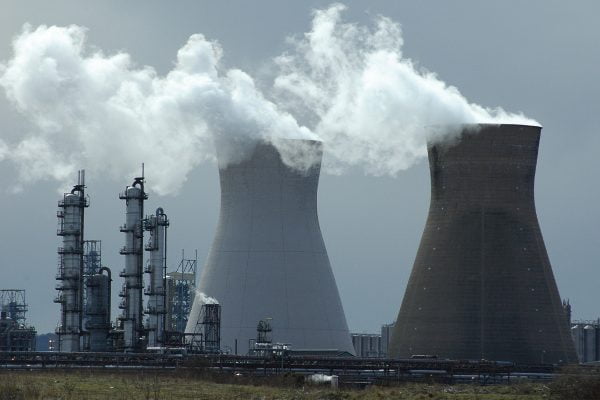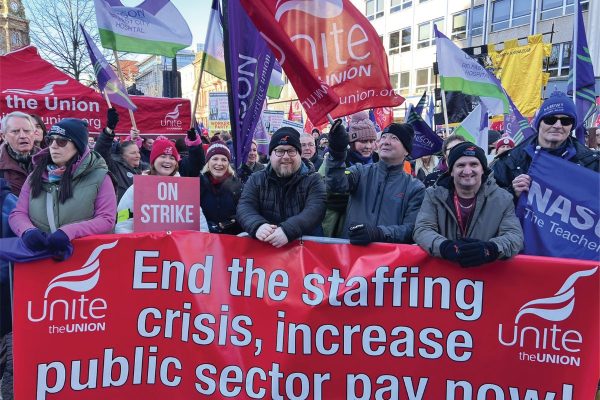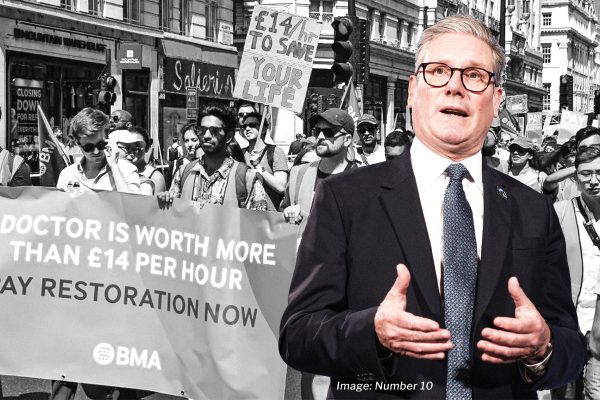Starmer’s Labour have accepted the recommendations of the independent pay review bodies and announced plans to offer hundreds of thousands of public sector workers an above-inflation pay rise.
This will amount to around 5-6 percent for most workers, at a time when the official rate of inflation stands at 2 percent. The junior doctors, specifically, are being recommended a deal that purportedly amounts to 22 percent over two years.
This has been welcomed by the trade union leaders, who are delighted with this tranquil resolution. At last, ‘our’ government is giving up the goods, and we can bring all these messy disputes to an end!

Remain vigilant
Understandably, many workers will be relieved to see an above-inflation pay deal, given the real-terms wage cuts they’ve experienced in recent years.
We must emphasise: any positive gains, first and foremost, are the product of the determined battles that workers have fought over the last few years.
Chancellor Rachel Reeves has admitted as such, explaining to her colleagues how the new Labour government could pay a ‘cost in terms of industrial strife’, if they failed to meet public sector workers’ pay expectations.
Workers should remain vigilant and level-headed, however. Labour’s pay package is not what it proclaims to be – and is certainly no long-term solution to workers’ problems.
For starters, it doesn’t address the years – in some cases, decades – of pay erosion faced by workers: both as a result of rampant inflation more recently, and in the longer-term due to wage repression since the crash of 2008.
The BMA calculated that for resident doctors (formerly junior doctors) to regain the position they had in 2010, their pay would have to be increased by 35 percent. And other public sector workers are not far behind.
According to figures from the Institute for Fiscal Studies, for example, between 2010-23, doctors, teachers, and nurses experienced real-terms pay cuts of 14.7 percent, 9 percent, and 6.5 percent, respectively.
Any gain is obviously to be welcomed. But we cannot allow ourselves to be disarmed. 6 percent this year represent only a small step in clawing back previous losses. And there are still stormy skies ahead.
Who pays?
As ever, these coming storms centre around the key question: who is going to pay for this?
Reeves has already made clear who she thinks should pay: us. Factoring this pay deal into the £22bn “black hole” she claims to have found in state expenditure, she has begun making “difficult decisions” – or cuts, as they are more commonly known.
Already, several planned infrastructure projects have been axed. This includes a previous Tory pledge to build 40 new hospitals.
Cancellations of railway extensions, attacks on pensioners’ fuel allowance, and a demand for ‘efficiency savings’ from all departments have also come down from the Chancellor’s office.
Increased pay on one side, in other words, will be accompanied by a deterioration in working conditions on the other. It will be a case of robbing Peter to pay Paul.
Similarly, it doesn’t exactly matter how much you pay new doctors, if you haven’t got functioning hospitals to put them in. As Nick Davies, a director at the Institute for Government think-tank, was even forced to point out: “It’s much harder for doctors, nurses, and teachers to do their jobs in crumbling buildings.”
Nor is it clear how much more ‘efficiently’ services that have already been stripped to the bone can be expected to run.
Each service attacked in this way means jobs lost and wages slashed. And it means towns left in uncertainty, as industries go to the wall – like Port Talbot in Wales, the Harland and Wolff shipyard in Belfast, or Grangemouth in Scotland.
In other words, what the government gives with one hand in the form of a pay rise, it will claw back with the other in the form of a raft of brutal attacks.
Prepare for battle
In reality, Labour are doing exactly as we predicted: carrying out the programme of big business now they’re in power. Austerity, far from being a political ‘choice’, is forced on any government that plays by the capitalists’ rulebook.
Ultimately, British capitalism is so weak that it has no other way to keep itself afloat. For the bosses and billionaire owners, investment to modernise industry and infrastructure is too expensive in the short term. The only option left, for them, is to demand attacks on the conditions of the working class.
To play up the ‘great gains’ of a 6 percent pay deal in this circumstance, as the trade union leaders do, in the hope of bringing about calm on the industrial front, is extremely dangerous. It amounts to sowing illusions in Starmer’s Labour government, just as it prepares to go on the attack.
Instead, what is needed is to face facts and tell workers the truth. This pay deal is only a limited first step, to buy some peace and time on the industrial front. And more importantly, the government – and its capitalist backers – want to make us pay for it with further austerity.
That means our class, far from being grateful for these ‘favours’ and crumbs, needs to get ready for a fight.
The union leaders are hoping for a quiet life. Their entire approach is based on class collaboration, not militant struggle. They are terrified of ‘rocking the boat’, politically and industrially, and will always seek the path of least resistance.
Instead, they should be explaining to members why these attacks are happening – and preparing a fightback, by ramping up organisation efforts in every workplace.
Austerity and cuts are part-and-parcel of the bosses’ attempt to shore up failing profits at workers’ expense. They are an inevitable product of capitalism. And if we want to be free of these threats for good, we need to build a force capable of overthrowing the capitalist system itself.
That, and not comforting fables or soothing fairytales, is what our class needs to hear and act upon.
Grangemouth: Fight to save the refinery!
Calum MacDonald, RCP Scotland
Empty promises and uncertainty surround the future of Grangemouth refinery, the sole crude oil refinery still operating in Scotland.
Scheduled to cease operations in spring 2025, the decision by Petroineos (a joint venture between PetroChina and INEOS) will result in the loss of 400 jobs at the Stirlingshire site, affecting hundreds of families and the local economy.
Grangemouth refinery supplies 80 percent of Scotland’s fuel, and makes up 4 percent of Scotland’s GDP.

This decision follows Petroineos’ record pre-tax profits of £107.5 million in 2022, exposing the bosses’ blatant prioritisation of profit over the livelihoods of workers and the environment.
INEOS is under the direction of Jim ‘The Rat’ Ratcliffe – an infamous union-buster, whose wealth is estimated at £30 billion.
Unite’s Sharon Graham urged politicians to collaborate with the union to “protect” jobs and to “show us the plan [to save Grangemouth]”. Yet, still, no concrete plan has emerged.
This mirrors the inaction seen in Port Talbot. Instead, what is needed is decisive action: an immediate build-up to strike action, with preparations to occupy the plant if Ratcliffe and co. try to play any games.
Ultimately, ‘The Rat’ has shown he can’t run such a vital industry. The refinery, and the whole sector, should be nationalised without compensation. And if we’re to bring about a green economy, then workers should be the ones in charge!
- No to any redundancies!
- Nationalise Petroineos and INEOS without compensation!
- Strike and occupy! Put Grangemouth under workers’ control!
Labour’s “New Deal” – same old exploitation
Maciej Krzymieniecki, Swansea
Labour has for a long time been talking about its so-called ‘New Deal for Working People’. Now that the party is in power, we can see how far their commitment to this programme really goes.
That Labour want to govern for business is obvious. In the months running up to the general election, Starmer and co. furiously reassured the billionaires and bosses that the ‘Labour’ Party is in fact a pro-business party.
Starmer’s government is expected to legislate the ‘New Deal’ in September. But the pressure of the capitalists is already evident. As soon as the election was announced, they were already trying to water down these policies, to the – mild, verbal – protests of some trade union leaders.
Now that Starmer is in Number 10, the lobbying of the capitalists against the ‘New Deal’ will continue.
Aside from one or two crumbs to try and foster class peace, such as the repeal of the Minimum Service Act, big business doesn’t want workers getting the whip hand over them. And Labour, as they have already shown, are happy to listen.
So that leaves the trade union leaders with a question to answer: what will they do if Labour reneges?
At the moment, they continue to foster illusions in the Labour government, in order to keep the government sweet during negotiations.
But there is another road. Rank-and-file union members must be told honestly that they will have to face down attacks from Starmer’s Labour; that this government cannot be trusted to keep its promises.
This means preparing for strike action, fighting for a real programme of struggle, based around clear socialist demands, and welding unions together at a grassroots level.
Starmer’s Labour won’t save us. We – the workers – can rely only on our own strength!






